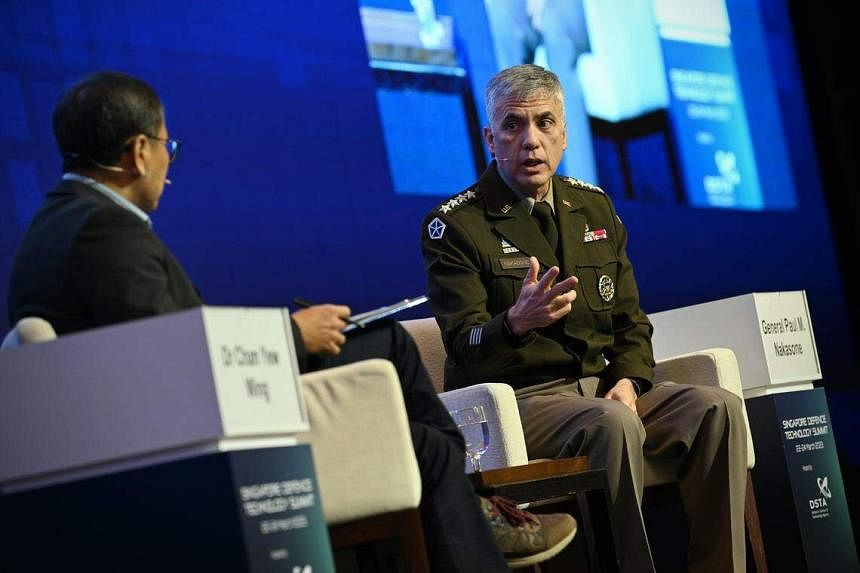Bhagyashree Garekar

SINGAPORE - China and Russia are trading information in cyberspace, a development that the United States regards with deep concern, says the man charged with preventing and defeating cyber attacks on America.
“What we see with both China and Russia is a close association of being able to share information,” General Paul Nakasone, the head of the US Cyber Command and director of the National Security Agency, told The Straits Times in an interview on Friday.
He was asked if he saw signs that the two countries were collaborating in cyberspace, amid accusations from top US officials that Beijing is considering supplying arms to support Russia’s invasion of Ukraine.
Referring to the meetings this week in Moscow between Chinese President Xi Jinping and his Russian counterpart Vladimir Putin, Gen Nakasone said the US was in the process of identifying the nature of information that the two countries had shared. “What type of information was shared? What type of discussions are they conducting? This is broadly what we are looking at.”
In its annual threat assessment released in early March, the US said China represents the topmost cyber espionage threat to the US government and private-sector networks. The report also named Russia, Iran and North Korea as other nations with growing cyber attack capabilities.
“We’re very concerned not only about China and Russia, but all adversaries that are operating in this domain of cyberspace. We continue to maintain strong vigilance against those nations to understand what they’re trying to do,” Gen Nakasone said. “What is their tradecraft? What are the techniques that they’re using?”
He was speaking to ST on the sidelines of the third and final day of the Singapore Defence Technology Summit, a global gathering of experts from government, the private sector and academia on defence and security issues.
Interactions between China and Russia – which have committed themselves to a “no-limits partnership” – have been under sharper scrutiny since US Secretary of State Antony Blinken said in February that Chinese firms were already providing “non-lethal, dual-use-type support” to Russia.
He did not provide any evidence or details to back his claims, but dual-use items can include chemicals or computer chips which China exports to Russia. These have commercial as well as military applications.
Washington also says it has new information that China could go on to provide “lethal support” to aid the Russian military, which is facing battlefield reverses and supply shortages.
China has flatly denied any weapons deals with Russia and instead blames the US and its allies for worsening the conflict by providing Ukraine with weapons.
While declining to give details of cyberspace collaborations between nations it regards as adversaries, Gen Nakasone said his office was focused on seeing the trends and alerting policymakers, including those in the region.
Asia has emerged as the region most targeted by cyber attacks, receiving one in four recorded attacks in 2022, according to analyses such as IBM’s Security X-Force Threat Intelligence Index.
Over his five years in office, Gen Nakasone has spearheaded a “hunt forward” campaign that attempts to pre-emptively disable cyber attacks. “We conduct ‘hunt forward’ operations, where small groups of personnel go forward at the request of a foreign government to assist in hunting on their networks. We’ve done this in 22 different nations, in over 70 missions,” he said.
“What we do is identify malware and tradecraft that they’re then able to share broadly with the world. And this is like an antidote, almost like a digital dividend, in the work that we do collectively.”
The US is in partnerships with several Asean nations to strengthen their cyber fences and to share intelligence that has included the ability to thwart ransomware attacks.
“A significant outcome is that these nations have been able to understand that there are a number of adversaries that are looking for an ability to steal their data, intellectual property or impact their economies. Being able to forestall that has been helpful for not only them but for us as well,” said Gen Nakasone.
He said the US was “constantly” sharing information with partners. “Hey, this actor is operating in a manner that is trying to influence legislation or trying to create action that’s going to be detrimental to our national interest. We do expose that,” said Gen Nakasone. “What you don’t want to do is to keep this hidden. People need to understand what’s going on.”
No comments:
Post a Comment